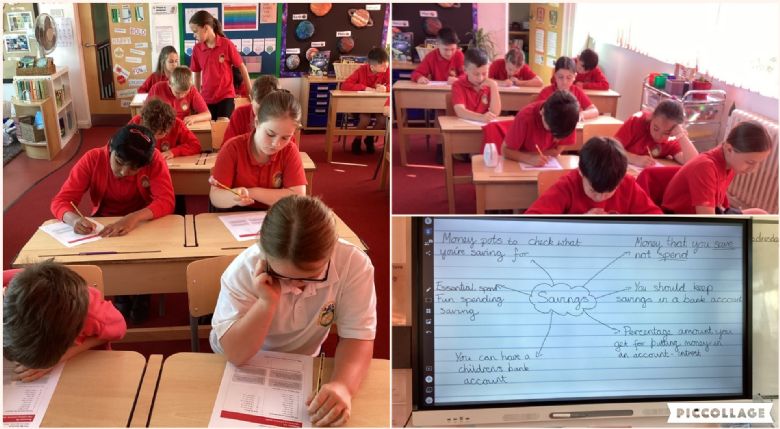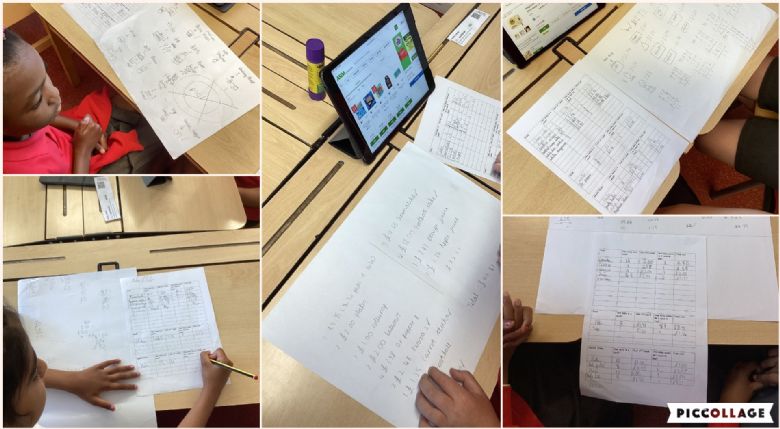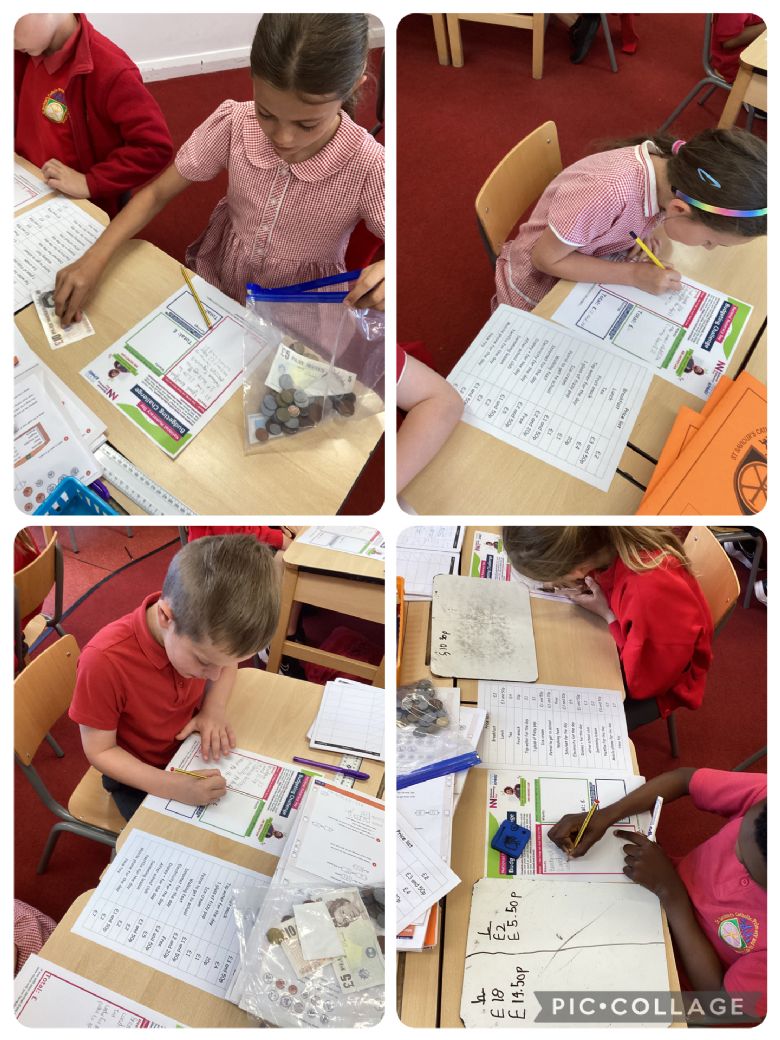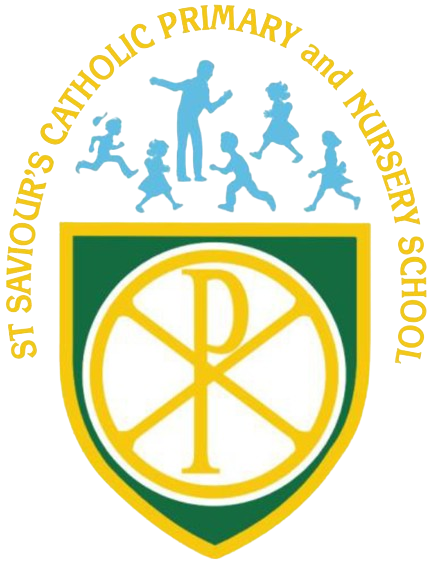Maths
Intent (Why we learn…)
At St Saviour’s Catholic Primary and Nursery School, we recognise the significance of children’s early mathematical development and how this will impact their future lives. We aim to remove the culture of ‘I can’t’ and celebrate the ‘I can try’. We want to give each child the self-confidence and resilience to reach their full potential; having the tools to calculate fluently, reason logically, problem solve and think deeply and in abstract ways.
Throughout their mathematical journey, the children at St Saviour’s will have mastered a range of skills. These are:
- To be enthusiastic, inquisitive, lifelong learners: we aim to provide a culture where mathematics is discussed with positivity and excitement. We aim to pose open ended challenges where children see that there are often many possibilities and approaches to solving problems.
- To be strong communicators: we aim to provide a culture where mathematical talk is embraced and encouraged. There are regular opportunities for peer discussions, classrooms promote the use of topic specific language and teacher’s confidently model clear mathematical talk through stem sentences.
- To be well-rounded, independent and resilient learners with aspirations: with the use of a well taught, progressive curriculum, children will develop skills in fluency, reasoning and problem solving equally. Children will be encouraged to take ownership of their learning, with concrete resources provided for all age groups so that they have the tools to unpick and deepen their understanding of mathematical concepts.
- To develop and use their God given talents by being creative: we aim to provide opportunities for children to apply mathematical learning beyond the classroom through challenges and competitions. We want children to recognise the skills and talents of others and how their peers can be some of the best teachers.
- To be responsible citizens who are eager to make a positive contribution to their community and wider society: we aim to deliver mathematical teaching in a way that children respect each other and their ideas, they listen to and value others’ ideas and recognise how different approaches can positively impact their own progress. We aim to provide opportunities for the children to apply their mathematical skills in preparation for the working world around them.
Reading underpins all areas of learning. Maths is flooded with polysemantic vocabulary, causing possible ambiguity and misconceptions, therefore, the language of mathematics is constantly needing to be translated by teachers. We support our children as they learn to read and unpack mathematical operations within problems accurately and confidently. We aim for our children to be able to ‘read like a mathematician’.
Implementation (How we teach...)
The maths curriculum at St Saviour’s is planned and delivered using White Rose. Clear and robust knowledge organisers ensure that teaching is consistent, children are taught and supported in their knowledge and understanding appropriate to their age group. Our maths curriculum is well mapped out and ensures teaching is cohesive and progressive year upon year.
Maths teaching is based on high expectations for all. Children are supported to reach at least age-related expectations alongside making strong progress from their individual starting points. Children have access to high quality resources and these support them in gaining a deeper understanding and mastery of key skills. Teachers model and promote a CPA approach, equipping the children with a range of strategies and methods needed to succeed.
Teaching for mastery and providing opportunities to apply skills and solve problems, supports the children’s development of transferable skills that will prepare them for their future; the resilience when faced with challenges, the confidence to continually explore and try new things and the motivation to succeed.
With ‘Quality First’ teaching and a range of AfL strategies, teachers conduct daily assessments in order to identify children who need additional intervention; children with SEN, children not making the expected progress or children needing additional challenge to deepen their understanding. Resources are regularly shared with teachers so that they are equipped to make robust and accurate judgements to inform future lessons and make adaptations where needed.
Summative assessments are used at the end of each topic to highlight the need for intervention. With teacher’s professional knowledge, end of term assessments are used to inform and guide attainment judgements and pupil progress is recorded using the ‘Sonar’ software.
At St Saviour’s, the children experience a broad and diverse maths curriculum beyond the classroom. Children develop key life skills that will enable them to contribute to the wider community and develop into well rounded individuals. Having a School Shop and Bank, the children are responsible for handling money, making connections between earning and saving as well as working in cooperation with others. All of which are skills needed in later life.
With the support of senior leaders, the subject lead receives up-to-date training to ensure that they have a sound understanding of their roles and responsibilities as a leader, as well as the knowledge to lead across the school. Involvement in cluster groups enables the subject lead to continually reflect and develop their expertise.
The children at St Saviour’s are taught by knowledgeable teachers, directed by passionate leaders which in turn develops them into inquisitive learners with a love for mathematics.
Impact (As a result…)
The impact of our maths curriculum can be seen in pupil’s books, on Tapestry (for the EYFS) as well as through pupil data and pupil voice. Outcomes in maths are improving and our commitment to mastery, open questions and an emphasis on developing mathematical talk creates and atmosphere for learning that is conducive to success.
Pupils’ progress in maths is measured through ongoing end of unit assessments and three termly assessments during the year. Pupil data is analysed to ensure attainment and progress is on track in each year group. Leaders and teachers identify target children who need interventions. These include pre and post teaching sessions. Interventions are planned on an individual basis and are implemented and evaluated regularly.
Pupils not only leave St Saviour’s with a secure understanding of key mathematical principals; but also, with a deep understanding of how to be resilient in the face of challenge and how to think critically to solve problems. They are skilful pupils, who can think deeply and understand that there are often many different approaches to one task. A skill needed to be a successful member of their community beyond St Saviour’s.
Maths at St Saviour's
At St Saviour's we have made the decision to use White Rose Education to help influence, inspire and inform the teaching of mathematics across the school.

White Rose is a programme designed by a team of maths experts to train, guide, help and support a positive change to the future of maths education for our children.
At the heart of White Rose is a mastery approach to maths.
So what does this mean?
It means that we:
- Put numbers first; a confidence with numbers is the first step to competency in the curriculum as a whole.
- Put depth before breadth; reinforcing knowledge again and again.
- Encourage collaboration; children can progress through their education as a group, supporting each other as they learn.
- Focus on fluency, reasoning and problem solving; it gives children the skills they need to become competent mathematicians.
Concrete Pictorial Abstract (CPA)
When children are introduced to a new concept, working with concrete physical resources and pictorial representations leads to a better understanding of abstract concepts (written calculation).
We use CPA throughout White Rose, from EYFS to Year 6.
Curriculum Maps
Times Tables Rockstars
At St Saviour's, the children in Key Stage 2 have access to Times Tables Rockstars. This is a great way to develop fluency, accuracy and speed in recalling multiplication facts up to 12. The children in Year 3 and Year 4 will access TTRS twice a week in school, in preparation for the Multiplication Tables Check (MTC).
We use the heatmaps to track progress, and encourage children to do the same!
We expect children to access TTRS at home as part of their homework for 10 minutes every day.
A little and often is key to develop recall and retention.
How to support at home
Maths with Michael
We understand that parents may feel like maths has changed and that it’s sometimes difficult to keep up to date with modern teaching methods.
With over 80% of primary schools and a growing number of secondary schools using White Rose Maths, it is important that we provide as much support to bridge the gap from school to home.
Below are some videos which will help to explain some of the methods and resources we use to support the delivery of maths at St Saviour's.
Video content:
- Has maths changed?
- Place Value
- Subtraction
- Multiplication
- Division
- Fractions
- Algebra
- Maths with Michael
1 Minute Maths
A simple game based app for EYFS up to Year 6 which can be accessed on a laptop, tablet or phone.
- Excellent practice – and no distractions.
- A clear, intuitive process that children pick up straight away.
- No login or internet access needed. Just download and play.
- Enjoyable and motivating… How many can they get correct in one minute?
- Helpful hints match those used in class.
- Brilliant for building number fluency and confidence.
- It’s FREE!
Maths beyond the Curriculum
On 21st May, the children enjoyed taking part in National Numeracy Day. This year's focus was on 'Money' and building children's financial understanding.
Year 5
"I liked learning about different ways to save money." Oliver
"I liked learning that different banks have different interest rates. " Mbongeni
"Now I know how to save and spend sensibly." Kaitlyn

Year 4
Year 4 enjoyed celebrating National Numeracy day by planning a party with a £50 budget. Some children were very careful and didn't overspend, but others had to rethink about their items and take them off the list or look for cheaper alternatives.

Year 3
Year 3 have learnt all about the 'wants' and 'needs'. The children had £20 and had to decide what they would spend it on during the day. The children couldn't believe how many 'secret' costs there were that they didn't know about - from the electricity to turn the light on in the morning, the petrol to get to school - it all adds up!
"I can't believe you have to pay for the after from the tap. I thought it was free!!" Frank


